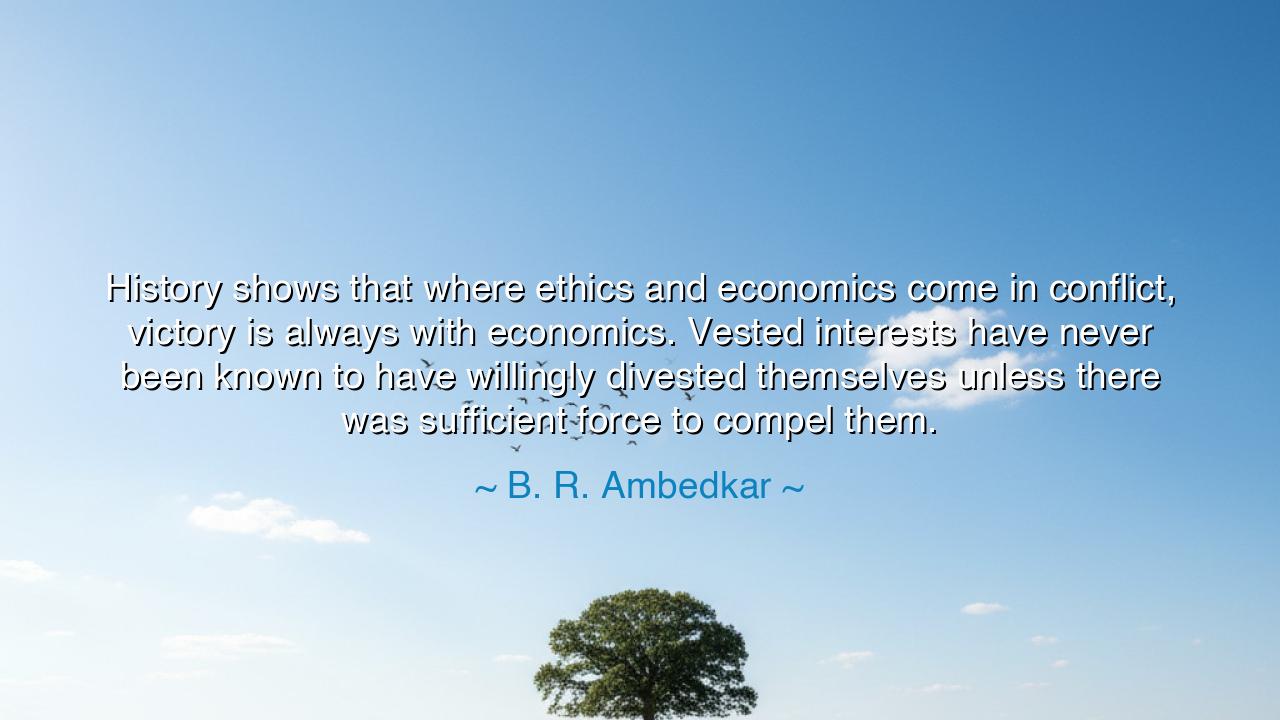
History shows that where ethics and economics come in conflict
History shows that where ethics and economics come in conflict, victory is always with economics. Vested interests have never been known to have willingly divested themselves unless there was sufficient force to compel them.






“History shows that where ethics and economics come in conflict, victory is always with economics. Vested interests have never been known to have willingly divested themselves unless there was sufficient force to compel them.” — Thus spoke B. R. Ambedkar, the great lawgiver of India and defender of the downtrodden. His words are neither cynical nor despairing—they are realist and prophetic, born from the fire of experience and the clarity of intellect. In this declaration, Ambedkar reveals a painful truth of the human condition: that morality alone cannot conquer greed, and that those who profit from injustice seldom surrender their power without resistance. His statement stands as both a warning and a challenge—to the conscience of nations and to the courage of those who seek to reform them.
To say that ethics and economics are often in conflict is to acknowledge the eternal battle between what is right and what is profitable. Ethics speaks of justice, compassion, and equality; economics, when driven by self-interest, seeks advantage, accumulation, and preservation of power. When these two forces clash in history, it is the stronger and more organized—economics—that tends to triumph. Ambedkar saw this truth written across the ages: in slavery, in caste oppression, in colonialism. The rulers, the landlords, the merchants—they did not yield to the cry of righteousness, but only when force—moral, political, or revolutionary—compelled them to do so. He understood that injustice is not merely a failure of heart, but a system of interest, guarded by those who benefit from it.
Consider the story of abolition, the struggle to end the transatlantic slave trade. For centuries, human beings were sold and exploited in the name of profit. Preachers pleaded for mercy, philosophers argued for equality, but the slave markets thrived. It was only when economic systems shifted—when industrial labor reduced dependence on slave work, when wars and revolutions disrupted the old order—that emancipation gained ground. The moral awakening was real, but it triumphed only when it found force—the power of collective action, political will, and social change. Thus, history proves Ambedkar’s point: ethics may inspire, but economics obeys only strength.
Ambedkar himself lived and labored in a world built upon economic hierarchy—the system of caste. The so-called “untouchables,” or Dalits, were not merely victims of superstition; they were the backbone of an economy that exploited their labor and denied their humanity. The privileged classes, bound by centuries of dominance, did not reform out of kindness; they reformed only when laws were written, movements rose, and pressure mounted from those who refused to accept subjugation. When Ambedkar led his people to drink from public water tanks, when he burned the Manusmriti, when he demanded constitutional rights—these acts were not mere protests of morality; they were strategic acts of resistance. Through them, he demonstrated that ethics must be armed with power, that justice requires not only the purity of heart but the strength of will.
In these words, Ambedkar speaks not only to his age but to all ages. He warns that vested interests—those who hold wealth, privilege, and authority—will never voluntarily yield what gives them dominance. They may preach virtue, they may cloak themselves in civility, but their actions are guided by preservation. It is not malice alone that sustains injustice, but the quiet comfort of advantage. Therefore, he says, only force—not violence, but the moral and political strength of an awakened people—can bring change. Laws must be written, voices must unite, and the oppressed must rise, not as beggars of pity but as claimants of justice.
Ambedkar’s insight is echoed in the revolutions of the world. When the American colonies broke free from Britain, it was not polite petition but the force of rebellion that secured liberty. When Mahatma Gandhi challenged the British Raj, his weapon was not the sword but nonviolent resistance—yet it was a form of force, for it shook the empire’s moral legitimacy. When women fought for suffrage, they were mocked and jailed, but they persisted until the old order could no longer stand. Each victory of ethics over economics required pressure, persistence, and sacrifice—never mere appeal to conscience alone.
Let this be your lesson, O listener: righteousness without strength is a whisper in a storm. Do not imagine that justice prevails simply because it is right. You must organize, you must educate, you must agitate, as Ambedkar himself taught. When you face the entrenched powers of greed or prejudice, remember that goodness must be joined with courage, that truth must be defended with endurance. Moral appeals awaken the heart, but collective action transforms the world.
And so remember, as B. R. Ambedkar declared, that where ethics and economics come in conflict, victory is always with economics—until we make ethics powerful enough to fight back. Let this truth not discourage you, but rouse you. For history belongs not only to those who wield power, but to those who dare to challenge it. Raise your voice, build your strength, unite your purpose—so that one day, the victory of economics will no longer be inevitable, and the reign of justice will no longer depend on force, but on the willing conscience of a free and enlightened humanity.






AAdministratorAdministrator
Welcome, honored guests. Please leave a comment, we will respond soon